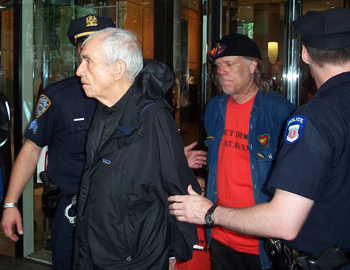"Oh, how the mighty have fallen," lamented King David in 2 Samuel 1:27.
On April 30, 2016, Daniel Joseph Berrigan died just ten days short of his ninety-fifth birthday. May God grant to him the eternal peace to which he witnessed for so long and with such passion.
Berrigan was many things to many people — Jesuit priest, poet (15 volumes), playwright, author of over fifty books, university professor, and peace activist. He spent a long life celebrating the good news of Jesus rather than the bad news of caesar. Most of all, like Elijah of old, he was a troubler of the modern conscience.
In 1968, he and eight other activists stole 378 draft files of young men who were about to be sent to Vietnam, dumped them into two garbage cans, poured homemade napalm on them, and burned them in the parking lot of the Catonsville, Maryland, draft board.
In 1980, he trespassed into General Electric's nuclear missile plant in King of Prussia, Pennsylvania, poured blood on some warhead nose cones, then hammered away to punctuate his prophetic point.
For these and similar activities, he and his brother Philip spent time on the FBI's Ten Most Wanted list, not to mention significant time in prison.
Berrigan was best known for his civil disobedience against government policies on a broad range of issues — racism (he marched in Selma), nuclear arms (he founded the Plowshares Movement), the death penalty, and most famously Vietnam (partnering with the likes of Howard Zinn and Thomas Merton). He was also a pro-life activist.
In her memoir Things Seen and Unseen, Nora Gallagher recalls meeting Berrigan in the spring of 1986. When she asked how many times he had been jailed for the gospel, he responded, "Not enough." For his 80th birthday he remarked, “The day after I’m embalmed, that’s when I’ll give it up.”
I've always loved his poem Credo:
 |
|
Berrigan arrested outside the US mission to the United Nations in 2006.
|
I can only tell you what I believe; I believe:
I cannot be saved by foreign policies.
I cannot be saved by the sexual revolution.
I cannot be saved by the gross national product.
I cannot be saved by nuclear deterrents.
I cannot be saved by aldermen, priests, artists,
plumbers, city planners, social engineers,
nor by the Vatican,
nor by the World Buddhist Association,
nor by Hitler, nor by Joan of Arc,
nor by angels and archangels,
nor by powers and dominions,
I can be saved only by Jesus Christ.
Berrigan was also a clear-eyed realist. I was interested to read in his New York Times obituary by Daniel Lewis about his deep discouragements.
Lewis writes, "While he was known for his wry wit, there was a darkness in much of what Father Berrigan wrote and said, the burden of which was that one had to keep trying to do the right thing regardless of the near certainty that it would make no difference. In the withering of the pacifist movement and the country’s general support for the fighting in Iraq and Afghanistan, he saw proof that it was folly to expect lasting results.
“This is the worst time of my long life,” he said in an interview with The Nation in 2008. “I have never had such meager expectations of the system.”
What made it bearable, he wrote elsewhere, was a disciplined, implicitly difficult belief in God as the key to sanity and survival."
I think this was his penultimate word rather than a final word.
In his book No Gods But One (2009), a chapter-and-verse study of Deuteronomy, he wrote: "Nor is the fall the final judgment, as though we were bereft of all hope. No, there has occurred an intervention of God, for healing and reconciliation. An intervention named Jesus." At the end of that book he calls us to "behave as though the truth were true."
Similarly, in his meditation on 1-2 Kings, The Kings and Their Gods (2008), he leaves us with this last word on his final page. "One must urge (to his own soul first) a firm rebutting midrash; bring Christ to bear. Read the gospel closely, obediently. Welcome no enticements, no other claim on conscience. Mourn the preachers and priests whose silence and collusion signal plain revolt against the gospel. Enter the maelstrom, the wilderness; flee the claim that would possess your soul. Earn the blessing; pay up. Blessed — and lonely and powerless and intent on the Master — and, if must be, despised, scorned, locked up — blessed are the makers of peace."
Image credit: Wikipedia.org.



